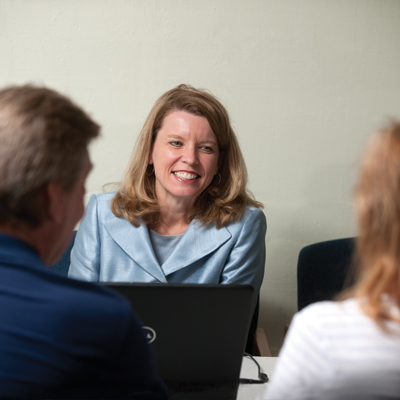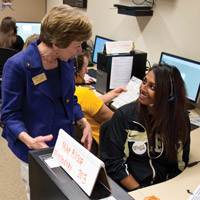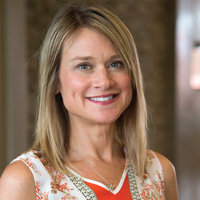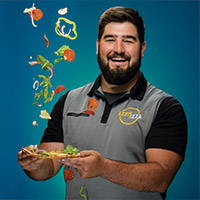
Diabetes Dialogue: Melissa Franks, assistant professor of human development and family studies, looks at the changing family dynamic when one spouse is diagnosed with Type 2 diabetes. (Photo by Mark Simons)
Prevention: From Lab to
Real Life
It's one thing to bring cutting-edge technologies and the latest methods to engineer laboratory breakthroughs. But not every woman's health issue relies upon a solution viewed through a microscope. Often, preventive care exposes the human element of healing, one person at a time.
Melissa Franks, assistant professor of human development and family studies, co-directs Purdue's Relationships and Health Care Research Lab. Her current work with links to WGHI looks at how social and family relationships affect chronic disease management — specifically adult-onset, or Type 2, diabetes. Though only one spouse in Franks' studies carries the disease, its management greatly affects the lives of both partners.
"We look at two different but interrelated perspectives in our work," Franks says. "We certainly look at married women who have a chronic disease and the role of their husbands in its day-to-day management. Then we also look at women's health and well-being when they're disease-free but have a partner with disease. How do they wear that other shoe in those scenarios?"
Contrasting spousal interaction in those opposite situations — who is patient and who is caregiver — is an important question for Franks. Although the prevailing literature on the subject suggests that wives take on more of a caretaker role, Franks' research suggests this stereotypical phenomenon may occur less frequently in the context of chronic illness.
"Our findings help us provide better preventive care because we're determining what kind of education and training family members need to provide the best care for a partner or family member with diabetes," Franks says. "This is the type of information that may need to be conveyed right at discharge when a family member has been hospitalized. It's information that's crucial during interventions — educating families to be effective providers of support. Sometimes what seems helpful to an untrained individual can backfire and instead interfere with disease management. This is all about preventive steps to ensure healthy outcomes."
Meghan McDonough, associate professor of health and kinesiology, is attempting to ensure healthy outcomes of her own in another sector of preventive care research. By focusing on the social and psychological aspects of physical activity in breast cancer survivors, McDonough seeks to link physical activity programs designed specifically for breast cancer survivors to patients' overall health and well-being.
"The clinical name for the phenomenon I'm researching is 'post-traumatic growth,'" McDonough says. "Essentially, we know that certain positive outcomes can derive from negative experiences. By pinpointing these occurrences, we can replicate them more effectively in tomorrow's survivors."
One key finding: When survivors of a shared traumatic experience — like breast cancer — become actively involved in physical group activity, the well-being of each group member improves. "It's similar to a support group," explains McDonough, "with the added benefit of physical activity. If you see another person who's been through what you're going through moving on and modeling positive behavior, then you're much more likely to adopt that behavior yourself."
One of the mainstays of cancer-survivor group activities is dragon boating — long canoes of about 20 members who work together in navigating river and lake courses. In the mid-1990s, many physicians recommended that breast cancer survivors curb upper-body physical activity for the fear it could induce lymphodyma. But a study of dragon boating suggested surprising recovery rates among participants. From there, the movement took off.
"Dragon boating really epitomizes the benefits of physical group activity in breast cancer recovery," McDonough says. "The participants aren't actively talking about their cancer; instead, they're working together toward a common goal, exerting themselves, improving their fitness, and in the back of their minds, they know they share a deep connection."
Unlike a breast cancer walk, which tends to be a one-time event, dragon boating requires several weekly practices year-round.
"The research suggests that it's about frequency, and it's about sustained participation," McDonough explains. "A one-and-done approach likely won't get the same results as a sustained routine. The improvements in self-perception, self-worth and social support are really promising."











